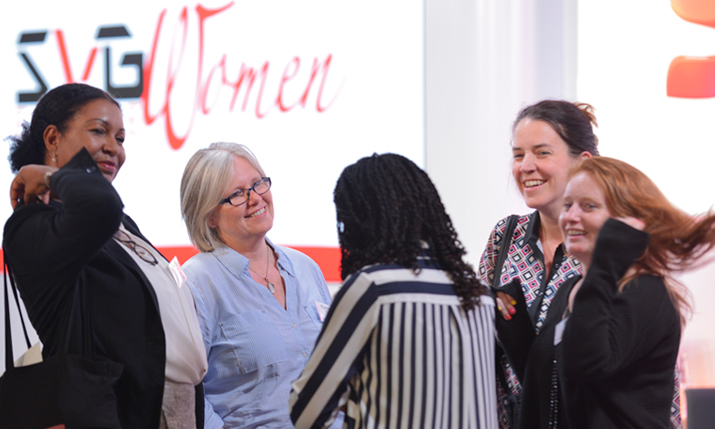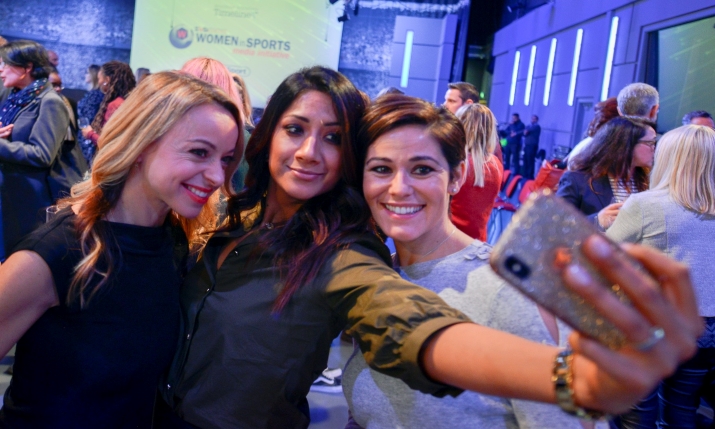International Women’s Day 2020: Why fight this fight?
Part 2 in our International Women’s Day special

Comparing notes and contacts at the SVG Europe Women summer event 2019 with Sky Sports and Sky Production Services
One question that members of SVG Europe Women are sometimes asked is why do we need a group in sports broadcasting especially for women? The answer is simple, and can be answered by taking a quick look around you.
Look at your company, look at other companies in the sports broadcasting industry, look at representation at trade shows and events, look at gender representation on panels. Women are in the minority.
A further layer to this is Black, Asian and minority ethnic (BAME) people; both BAME men and women are underrepresented in this industry, and women in particular.
International Women’s Day on Sunday 8 March has created a great opportunity for us to cast a reflective eye at the sports broadcasting industry, and here we take a look at why we need women and BAME people in sports broadcasting. Why fight this fight?
Fight the fight
Premier League Productions head of production, Anna Ward, says look at the business sense behind having more people from differing backgrounds within your business. “It’s important to get diversity of all kinds into sports broadcasting so as to increase cognitive diversity across the board,” she says. “People who have had different life experiences and come from different backgrounds will bring that cognitive diversity.
“The more people we have in the industry who think differently to one another, the more creative solutions we’ll benefit from as an industry,” Ward notes. “If you have 10 people who all think the same looking at a problem you’ll get 10 similar solutions; if you have 10 people who think differently you’ll get 10 different solutions. That has to be a good thing!”
Telstra Broadcast Services’ Anna Lockwood, head of global sales, says the answer is obvious: “Who wouldn’t want to strengthen the industry they love? Diversity of sports broadcasting talent better represents the audiences, athletes and fans that we are serving, and makes the industry stronger for all. As well as more fun!
“Diverse teams are more productive, more innovative, and better able to handle internal and external challenges and changes, all important characteristics for the global sports broadcasting business,” Lockwood noted.
Sky Sports executive director of production services and operations, Inga Ruehl, says she sees two reasons why we should fight this fight: “Number one, it is the right thing to do. We should enable everyone to have the same opportunities, regardless of gender or race or disability or sexual preference or age or social background etc.
“Number two, it is good for business,” Ruehl continues. “The more diverse viewpoints and approaches we have the better we perform. It is not always the easiest when the teams are less homogenous, but it definitely provides for much better, rounded discussions and outcomes. And it is so easy and obvious to notice how discussions and dynamics change when the people in the room are from a more diverse background. It also definitely makes for an overall more inclusive environment as everyone has to work harder on that.”

Sports presenters Abi Stephens, Reshmin Chowdhury and Eilidh Barbour at the previous SVG Europe Women winter networking event in November 2018
Claudia Corbisiero, producer at Noah Media Group, says: “I think it has become quite apparent that there is a huge amount of value in diversity. Diversity brings out different perspectives, experiences and opinions which is so important in what we do. A diverse community consumes sports broadcasting, so why should this not be made, hosted, produced and directed by an equally diverse group of individuals?
“Diversity is so refreshing in this industry as it helps us to try new things, tell different stories and see things in a whole new light,” Corbisiero states.
Kylie Jenner, freelance director, agrees: “Every work environment needs diversity, it brings different insights into situations. Too many of one group leads to a very narrow view of the world and sometimes a very unbalanced workplace with regards to attitudes.”
Forging ahead
Paula Rigby, Noah Media Group head of international production development, states: “Diversity in the sports broadcasting industry, or even within an organisation or company makes business sense, and anyone who doesn’t recognise this is either a dinosaur or a fool. Fortunately, we have organisations like SVG Europe Women and many BAME-focused ones, which actively work to educate, as well as illuminate, middle-aged white men that diversity in the workplace and across our industry makes business sense.
“I don’t see it as a fight; I see it more as a necessity for the long term success of a business,” Rigby continues. “As an example I recently attended a conference in Lausanne; as only one of eight women attending it was a stark reminder that even though companies like Noah Media Group are at the forefront, recently voted one of the Top 10 Places to work in TV 2020, we’re an anomaly not the norm, which is unfortunate in 2020.”
Rigby states: “My only advice is don’t patronise people, no matter their gender, race, colour or creed. I might’ve been the only woman in that room and definitely the only Australian, but when someone earns their seat at the table they did it because they’re good at their job!”
Lise Cosimi, industry consultant and external head of the SVG Europe Women Advisory Board, says: “Why fight? Because anyone who wants to work and follow her dream has the right to do it and should not be forbidden at entry!
“Diversity in general is a basic requirement in life,” she states. “Everyone should get a role. Bursaries for BAME people and women are offered in this industry, so why should we not take advantage of them to attract more people?”
Uphill struggle
Yet Jennifer Angell, industry consultant, says: “It’s 2020 and the industry is still struggling to attract BAME and women candidates. I think that there are very few jobs out there at the moment to attract people to production roles in the first instance.
“However, with that said, diversity is an issue not only in sports broadcasting but in all sectors of the economy,” Angell goes on. “I’m not sure there is a quick fix, just being aware that there is an issue and that there are discussions out there happening is positive.”
Angela Gibbons, CTV Outside Broadcasts commercial manager, comments: “Sport is a greater leveller; it provides an opportunity for true engagement across all segments of the population. Sport and sports broadcasting must no longer seen to be elitist; it has to be inclusive and engaging.
Gibbons goes on: “Good communication is the key and an understanding of how sport – from grass roots to national teams – is part of our culture and one of our greatest strengths irrespective of ethnic background.”
While Rigby says: “I’m optimistic that this [increased diversity] is the future of our industry and the ultimate goal we have is to support and encourage gender equality and diversity within the sports broadcasting industry as a whole; not just words or positioning lines but genuine acknowledgement.”
She concludes: “Let’s first make our industry interesting and dynamic to not just those who want to be on ‘the telly’. Once they’re engaged with our industry let’s support or nurture them, even if we fear they might leave. If we want a thriving diverse workforce in the future, now is the time for everyone to step up to the plate… not just women!” Rigby concludes.
The final International Women’s Day 2020 feature will be published later this week – watch this space!
